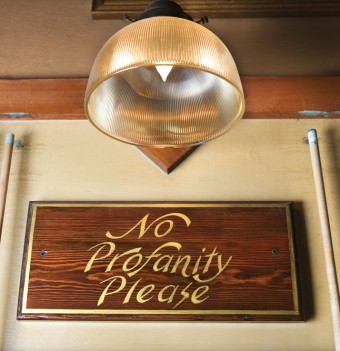What is a Tarnation?
 We have the word “tarnation” thanks to societal taboos against saying certain words- instead substituting in other words that often mean the exact same thing, but for some reason we find it acceptable to say the one rather than the other… Humans…
We have the word “tarnation” thanks to societal taboos against saying certain words- instead substituting in other words that often mean the exact same thing, but for some reason we find it acceptable to say the one rather than the other… Humans…
In this case, the pertinent word is “damn,” or more precisely the derivative “damnation,” which gave rise to the euphemism “darnation.”
How did the leading ‘d’ get replaced with a ‘t’?
In the 18th century in colonial America, the word “tarnal” was often used as a more acceptable alternative to “eternal,” which for a time could itself be used as a form of profanity- from the full expression “eternal God,” not unlike the modern “Jesus Christ!” when used in this sense.
To clean up the former, “eternal God” got shortened to “eternal.” The aphetic form of this, “ternal,” ultimately resulted in “tarnal.”
At some point, nobody knows exactly when, someone got the bright idea of combining the exclamation “tarnal” with “darnation,” and the result was “tarnation.”
The first documented instance of “tarnation” was in Royall Tyler’s 1790 play Contrast, where the character Jonathan uses it three times (along with the word “tarnal”):
“Why, such a tarnal cross tike you never saw! You would have counted she had lived upon crab-apples and vinegar for a fortnight. But what the rattle makes you look so tarnation glum?”
“Tarnation! That’s no laughing matter though.”
“Now the Colonel told father and brother,—you must know there are, let me see—there is Elnathan, Silas, and Barnabas, Tabitha—no, no, she’s a she—tarnation, now I have it—there’s Elnathan…”
Another interesting note is that while today “tarnation” is most closely associated with the South, and particularly cowboys, it was originally a New Englandism that ultimately spread throughout the new country.
If you liked this article, you might also enjoy our new popular podcast, The BrainFood Show (iTunes, Spotify, Google Play Music, Feed), as well as:
- How the Tradition of Saying “Pardon My French” Started
- Split Infinitives are Not Incorrect Grammatically
- What “Mrs.” is Short For
- Is Eating Your Boogers Good For You?
- The Surprising Truth About Cousins and Marriage
Bonus Fact:
- Ever wondered what the symbols used instead of spelling out a swear word explicitly, as in “F*@k”, are named? In this context, the symbols are known as “grawlixes.”
- “Profane” first popped up in English around the 15th century and comes from the Latin “profanus,” meaning “outside the temple” or “unholy”.
- A paper, “The Utility and Ubiquity of Taboo Words” from the Massachusetts College of Liberal Arts, surveyed the various studies that have been done on swear word rates in every day English conversation. They found that based on all the studies done on the subject to date, approximately 0.5%-0.7% of all spoken words are swear words. This rate is only slightly less than the rate that English speakers say “we,” “us,” and “our.”
- The recent autobiographical documentary Tarnation was originally made on a budget of just $218.32. Its gross box office earnings were $1,162,014. That said, about $400,000 was used to distribute and get the film in the form it needed to be for theaters.
- “Sam Hill” is another euphemism from the same era as “tarnation”; this one of unknown origin but used as a substitute for “hell.”
| Share the Knowledge! |
|






How can have six comments and none listed.
Just the way the wordpress / this theme software works where pingbacks are counted as comments, but don’t show up. I actually disabled pingbacks a long time ago for this very reason, but before I did that when people linked back to the article and pinged the site, it would count.